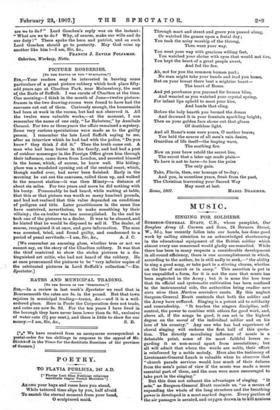PICTURE ROBBERIES.
ITO THE EDITOR Or se Bankroll:1 Sva,—Your readers may be interested in hearing some particulars of a great picture robbery which took place fifty- odd years ago at Charlton Park, near Malmesbury, the seat of the Earls of Suffolk. I was curate of Charlton at the time. One morning—I think in the month of June—twelve picture- frames in the two drawing-rooms were found to have had the canvases cut out of them. Curiously enough, the housemaids had been at work in the room, but had not observed it. All the twelve were valuable works,—at the moment, I can remember the name of one only, "Le Raboteur," by Annibale Caracci. For two or three years the affair remained a mystery. Some very curious speculations were made as to the guilty person. I remember the late Lord Suffolk saying to me, after an interview which he had had with the police, "Do you know P they think I did it Then the truth came out. A man who had been butler in the family, and had had a post of outdoor messenger in the Foreign Office given him through their influence, came down from London, and secreted himself in the house, which, of coarse, he knew well. His hiding- place was a woodshed opening out of the central court, which, though roofed over, had never been finished. Early in the morning he cut out the canvases, rolled them up, and walked to the nearest station—it was then Minety—a distance of about six miles. For two years and more he did nothing with his booty. Presumably he had heard, while waiting at table, that this or that picture was worth so many hundred pounds, and had not realised that this value depended on conditions of pedigree and title. Later practitioners in the same line have contrived, nevertheless, to make something by their villainy; the ex-butler was less accomplished. In the end he took one of the pictures to a dealer. It was to be cleaned, and he hinted that he would be disposed to sell it. The dealer, of course, recognised it at once, and gave information. The man was arrested, tried, and found guilty, and condemned to a period of penal servitude. —I am, Sir, Ac., A. J. C.
[We remember an amusing gloss, whether true or not we cannot say, on the story of the Charlton robbery. It was that the thief contrived to show the stolen pictures to a dis- tinguished art critic, who had not heard of the robbery. He at once pronounced the pictures to be "very inferior copies of the celebrated pictures in Lord Suffolk's collection."—En. Spectator.]










































 Previous page
Previous page